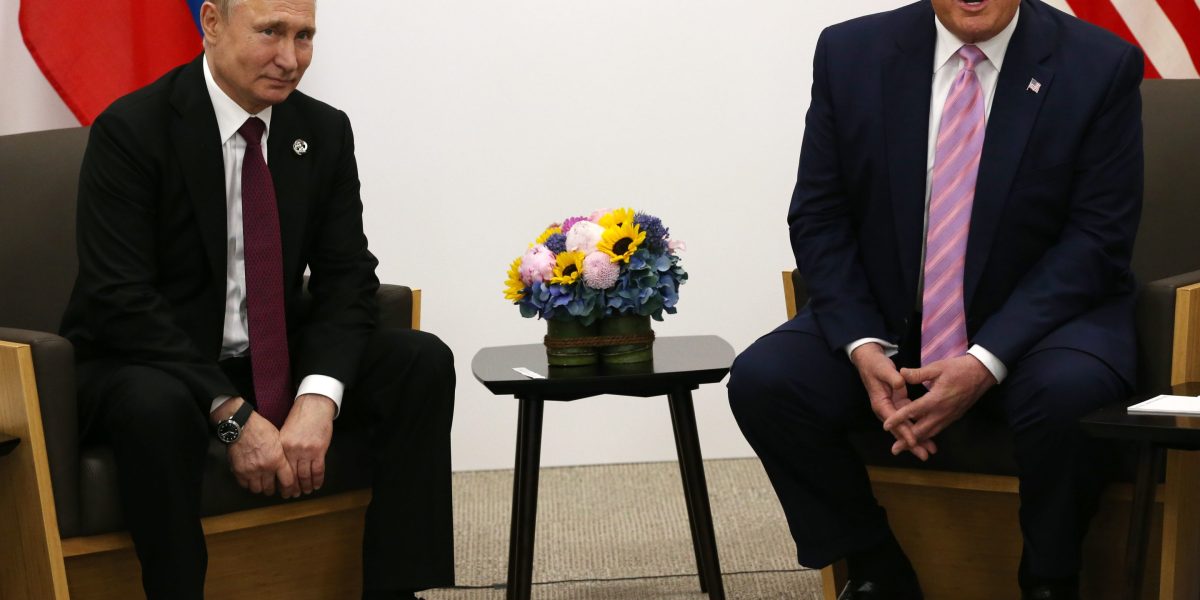- President Donald Trump’s repeated interest in taking control of Greenland has not gone unnoticed in Russia. During a Thursday speech, Russian President Vladimir Putin said he considered the U.S. interest in Greenland to be serious, pointing to past efforts to acquire the territory. Greenland has massive deposits of rare minerals that are critical to global supply chains, which the Trump administration sees as vital to U.S. interests.
Russian President Vladimir Putin cautioned against taking the Trump administration’s newly declared push for taking over Greenland lightly.
In a speech in the Arctic Circle city of Murmansk, which lies in the northwestern corner of Russia, 110 miles from the Finnish border, Putin said he was taking President Donald Trump’s efforts to claim Greenland for the U.S. seriously.
“It can surprise someone only at first glance,” Putin said, according to an English translation of the speech by state-owned media. “It is a profound mistake to treat it as some preposterous talk by the new U.S. administration. Nothing of the sort.”
Since taking office two months ago, Trump has made clear he is eyeing U.S. territorial expansion by annexing Greenland. Trump pointed to Greenland’s rich but untapped mineral deposits as a reason why controlling the territory was vital to U.S. national interest.
The government of Greenland, which is an autonomous region of Denmark, has adamantly rejected any notion that it would become part of the U.S. Both political leaders and citizens have said they have no intention of joining the U.S., while Danish Prime Minister Mette Frederiksen said the island was “not for sale,” and that Trump’s interest in Greenland was “not a joke.”
Greenland has 25 of 34 “critical raw materials,” according to a 2023 report from the European Commission. Among those deposits are rare earths and graphite, which are critical for the production of EVs. Other rare and highly coveted raw materials include titanium, tungsten, and uranium, which are used in everything from medical devices to light bulb filaments to nuclear fuel. Currently, the global market for these materials is dominated by China, which has deep reserves of them within its borders. If the U.S. were to control Greenland’s critical resources, it would have its own access to them, thus breaking its reliance on Chinese mining.
Greenland also has unmined supplies of valuable commodities like gold and diamonds.
On Thursday, ahead of Vice President JD Vance’s visit to Greenland, Trump reiterated his desire to take the island.
“We’ll go as far as we have to go,” Trump told reporters in the Oval Office. “We need Greenland.”
Greenland’s geographic positioning between North America and Europe also makes it a crucial trade route between the western and eastern hemispheres. Shipping routes to Asia and Europe through the Arctic are about 40% shorter than others, such as via the Suez and Panama canals, according to the U.S. Naval Institute, though it cautions shorter shipping routes does not necessarily equate to faster or cheaper transport. Traveling through the Arctic is more cumbersome because cargo ships need icebreakers and crews need to be specially trained for the frigid climate.
Russia, which controls more territory in the Arctic Circle than any other country, sees that part of the world as critical to its own national interests for the same reasons. In his speech, Putin referenced Russia’s need for trade routes through the Arctic and its role as a critical hub of oil and natural gas production. In recent years, Putin has grown increasingly concerned about what he considers to be the West’s encroachment on Russia’s influence in the Arctic. He was particularly frustrated when Finland and Sweden joined NATO in 2023 and 2024, respectively. Russia, which shares an 800-mile border with Finland, called the country’s admittance to NATO a mistake.
“The role and importance of the Arctic for Russia and for the entire world are obviously growing,” Putin said. “Regrettably, the geopolitical competition and fighting for positions in this region are also escalating.”
Owing to the Arctic Circle’s growing importance in global geopolitics, Putin was unsurprised the U.S. was angling for more influence in the region.
“The United States has serious plans regarding Greenland,” Putin said in his speech. “These plans have long historical roots … and it is obvious that the United States will continue to consistently advance its geo-strategic, military-political, and economic interests in the Arctic.”
The U.S. first took an interest in acquiring Greenland in 1867. Shortly after completing the purchase of Alaska from the Russian Empire, then–Secretary of State William Seward set his sights on acquiring Greenland from Denmark. The two countries never reached an agreement. Later, after World War II, President Harry Truman offered Denmark $100 million in gold and a portion of Alaskan oil. That offer was rebuffed.
During World War II, the U.S. had several military bases in Greenland that surveilled the Axis powers and were meant to be a first line of defense against any potential westward expansion on their behalf. The U.S. continues to maintain bases in Greenland.
Putin alluded to the possibility that if the U.S. were to take control of Greenland, it would escalate tensions with Russia. He accused NATO countries of using the Arctic as a “springboard for possible conflicts.”
This story was originally featured on Fortune.com
Source link

 Entertainment8 years ago
Entertainment8 years ago
 Politics8 years ago
Politics8 years ago
 Entertainment8 years ago
Entertainment8 years ago
 Entertainment8 years ago
Entertainment8 years ago
 Tech8 years ago
Tech8 years ago
 Tech8 years ago
Tech8 years ago
 Tech8 years ago
Tech8 years ago
 Politics8 years ago
Politics8 years ago







